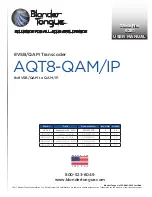
EN
LoRaWAN US915 PULSE - User guide version V1.0.0
14
Page
of 26
FR
2.
PRODUCT OPERATION
2.1. Global Operation
Important:
adeunis® use the most significant byte first format.
The product has several operating modes:
2.1.1
PARK mode
The product is delivered in PARK mode, it is in standby mode and its consumption is minimal. To switch
the product out of the Park* Mode pass a magnet across it for a duration higher than 6 seconds. The
green LED illuminates to indicate the detection of the magnet and then flashes quickly during the prod
-
uct starting phase.
The device then sends its configuration and data frames.
2.1.2
COMMAND mode
This mode allows the user to configure the registers of the product.
To enter this mode, connect a cable to the micro-USB port of the product and enter the command
mode by an AT command (see paragraph 3).
2.1.3
OPERATING mode
This mode allows the user to operate the product in its final use. It should allow a maximum of autono
-
my to the product.
2.1.4
Management of the low battery
When the product detects that the battery is not anymore in capacity to deliver the energy needed to
send a frame (extreme temperatures or end-of-life of the battery) it waits to be in capacity to transmit.
If it detects that the delay generated is longer than 1 minute it informs the user via the “battery low”
flag in the status byte of each frame.
PARK MODE
OPERATING
MODE
OFF (dead bat
-
tery)
COMMAND
MODE
Command sending
by serial link
Presence of a ma-
gnet on the product
>6s
Send “battery low”
flag
Auto adaptation
(cf management
of the low bat
-
tery)
The battery low alarm is switching off if the battery is replaced or when the temperature conditions are
favorable for the proper functioning of the battery.
Product
should send
a frame
The product
is waiting to
be able to
emit
The product
sends its
frame
Delay
is lower
than 1 min-
ute ?
“Low bat
-
tery” alarm
appears in
status byte
Battery is
sufficient
to send
the frame
?
yes
no
no
no
no
yes












































